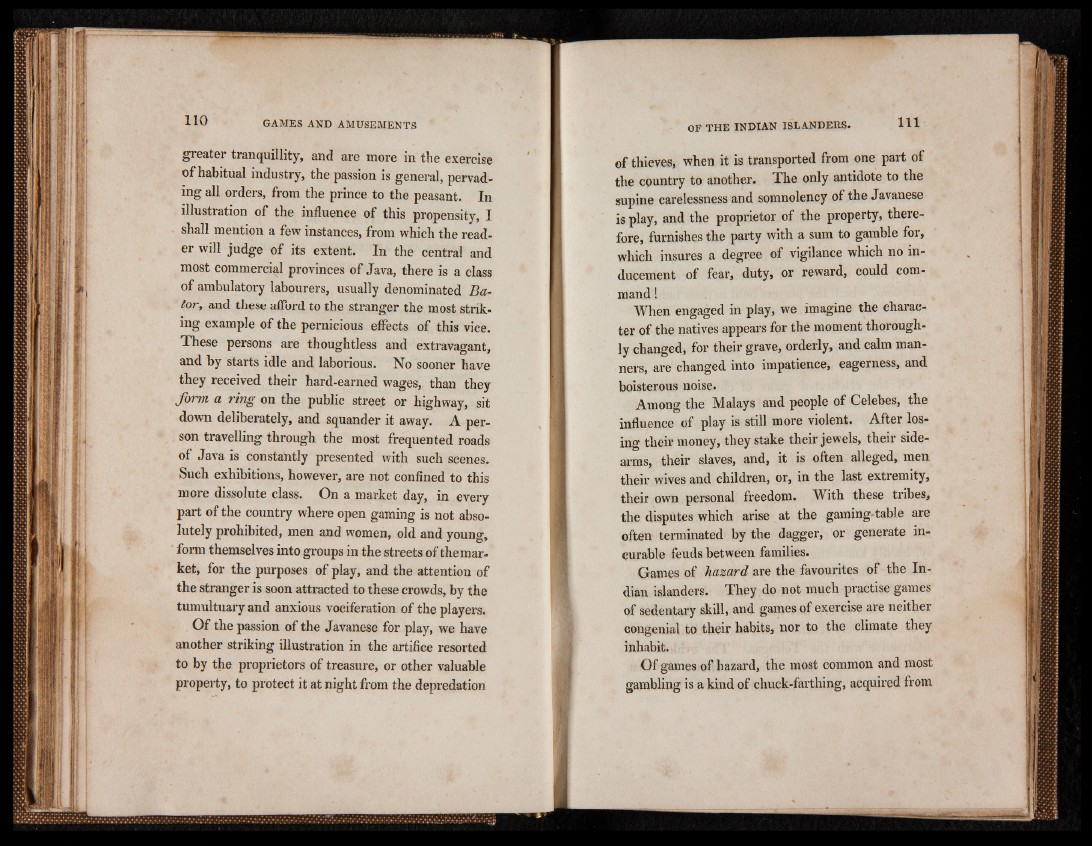
greater tranquillity, and are more in the exercise
of habitual industry, the passion is general, pervading
all orders, from the prince to the peasant. In
illustration of the influence of this propensity, I
shall mention a few instances, from which the reader
will judge of its extent. In the central and
most commercial provinces of Java, there is a class
of ambulatory labourers, usually denominated Bator,
and these afford to the stranger the most striking
example of the pernicious effects of this vice.
These persons are thoughtless and extravagant,
and by starts idle and laborious. No sooner have
they received their hard-earned wages, than they
form a ring on the public street or highway, sit
down deliberately, and squander it away. A person
travelling through the most frequented roads
of Java is constantly presented with such scenes.
Such exhibitions, however, are not confined to this
more dissolute class. On a market day, in every
part of the country where open gaming is not absolutely
prohibited, men and women, old and young,
form themselves into groups in the streets of themar-
ket, for the purposes of play, and the attention of
the stranger is soon attracted to these crowds, by the
tumultuary and anxious vociferation of the players.
Of the passion of the Javanese for play, we have
another striking illustration in the artifice resorted
to by the proprietors of treasure, or other valuable
property, to protect it at night from the depredation
of thieves, when it is transported from one part of
the country to another. The only antidote to the
supine carelessness and somnolency of the Javanese
is play, and the proprietor of the property, therefore,
furnishes the party with a sum to gamble foi,
which insures a degree of vigilance which no inducement
of fear, duty, or reward, could command
!
When engaged in play, we imagine the character
of the natives appears for the moment thoroughly
changed, for their grave, orderly, and calm manners,
are changed into impatience, eagerness, and
boisterous noise.
Among the Malays and people of Celebes, the
influence of play is still more violent. After losing
their money, they stake their jewels, their side-
arms, their slaves, and, it is often alleged, men
their wives and children, or, in the last extremity,
their own personal freedom. With these tribes,
the disputes which arise at the gaming-table are
often terminated by the dagger, or generate incurable
feuds between families.
Games of hazard are the favourites of the Indian
islanders. They do not much practise games
of sedentary skill, and games of exercise are neither
congenial to their habits, nor to the climate they
inhabit.
Of games of hazard, the most common and most
gambling is a kind of chuck-farthing, acquired from